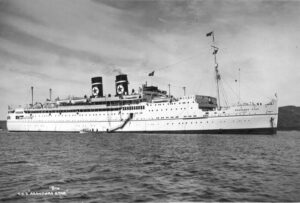
81st Anniversary of the Sinking of the Arandora on 2nd July 1940
Edited version of Alfio Bernabei’s article first appeared in the Anpi-London Facebook page on 2nd July 2021 here
The 446 Italian civilians in the United Kingdom who drowned 81 years ago on 2nd July 1940, in the sinking of the Arandora Star off the Irish coast by a U-boat, must be added to the list of deaths caused by fascism.
The Italians on board were 712 (numbers vary, including those who died). None of them would have ended up on the ship that was taking internees to Canada if Mussolini hadn’t declared war on the UK on June 10, a cowardly decision, apart from anything else, given the situation in which the United Kingdom was in at the time.
None of them would have been caught in the blitz of arrests that followed the declaration of war – a clamp down aimed at preventing the possible formation of a fifth column to assist Germany to invade the UK along with the Italian ally.
The Home Office and MI5 had been concerned since 1936 by the very public activities of the London branch of Italian Fascist Party with its HQ in the heart of Soho. Its weekly, Italia Nostra, was boasting about having thousands of “organized” in England.
MI5 had deemed necessary to acquire lists of Italian fascists considered dangerous or ‘desperate characters’, an estimated 1500 of them.
What were the fascists “organizing” from their HQ at 15 Greek Street that was worrying MI5, the Home Office, and ultimately, the War Office? What threat were they posing?
Leaving aside the fact that Mussolini was helping finance Oswald Mosley’s BUF, the Italian fascists were expanding and supervising about a dozen branches of the fascist party set up thorough the United Kingdom.
They were staging parades of over a thousand people at Edgware stadium in London with the fascist salute from the Mussolini envoy, Edda Ciano, in the presence of the Italian ambassador Dino Grandi – an enthusiastic visitor to the “Mussolini Camp” in Maidstone, Kent, a paramilitary fascist initiative.
In 1936, they were even sending fascist volunteers from London to Africa to kill Ethiopians and, finally, they were spreading fascist indoctrination to a whole new generation through schools – at the Italian high school in Kensington, for instance, students were handling replica guns and learning to obey orders.
Orders, commands, were part of the military language under which the Italian community in the United Kingdom lived for nearly twenty years, supervised and monitored. In effect, the Italian community was taken hostage by fascists from 1920 onwards. And this is where the dates and statements are needed to prove it.
On November 4, 1919, the URMI, Italian Union of Ex-Soldiers was set up in London and in 1920 it launched its newspaper, La Cronaca.
What were these former soldiers saying? “Our status of ex-military men gives us the right to intervene directly in all the issues affecting the Italian community in the United Kingdom”. They elected themselves as guardians and enforcers of order and discipline. They gave warnings that they would attack those who refused to obey. “OBBEDIRE”, they wrote in capital letters, or we can hit you.
Then, on June 12, 1921, the London Fighting Fascio was set up in London. It immediately began to recruit Blackshirts at 25 Noel Street. A mere six months later, the London Section of the Italian National Fascist Party was established with the first assembly held on January 15, 1922.
On this occasion Captain Giuseppe Moraschi explained what fascism intended to achieve through the Italian communities abroad “and in London in particular” : “We want to set up a new Italian Empire… made up of more than ten million of Italian workers… we need to educate them and organize them for national purposes and form them into a compact and homogeneous community… without violence, but by any other means.”
The progressive-capillary annexation of the Italian community taken hostage began in London. The Dante Alighieri Society that dealt with Italian schools, the Italian Hospital, the Cooperative Club, the Mazzini-Garibaldi Club, the union of workers in the catering industry, SILAM, were all forced to capitulate under the direction of the fascist party.
Some tried to resist, including a priest, Domenico Crescitelli, at St Peter’s Church in Clerkenwell. But the pressure was too strong. The Italian embassy and consulate were becoming representatives of the fascist party and were supporting these developments.
This is how the Italian community in the UK became – as the fascists put it – part of “a state in miniature”, a showcase of fascism, with a strong dose of military rhetoric: we are “an advanced pawn”, “a compact army”, a “phalanx”.
After the start of the war in 1939, meetings of Italian fascists at their new luxurious HQ near Trafalgar Square were announced using the command among soldiers “Adunata”, a military assembly.
Acts of defiance, brainwashing, and indoctrination – the staple diet for the Italian community in the United Kingdom. And all very much in the open. See, for example, the “public wedding” with fascism-cum census that took place in 1936 when the names of thousands of Italians were published by the fascist newspaper in the UK, Italia Nostra.
It named those “loyal to the regime” who had donated a watch, money, wedding rings, earrings, gold chains, for a war that was killing people in Ethiopia, so that no one could really be “innocent” anymore – ultimately, these “donations” were ending up in nerve gas and bombs raining on men, women and children.
Finally, the Italian community that had been held hostage for nearly twenty years paid the hard price.
Within hours of Mussolini’s declaration of war on 10th June arrests began.
Unfortunately, among the 4500 Italians who ended up in internment camps there were also many who had little to do with politics, and, most tragic of all, some of those arrested had been on a list provided by the Labour Party to the Home Office of “Italians to be protected in case of war”.
One of them was Decio Anzani who had been a leading militant antifascist – he was among those who died in the sinking of the Arandora Star – 446 deaths, a tragedy caused by fascism.
